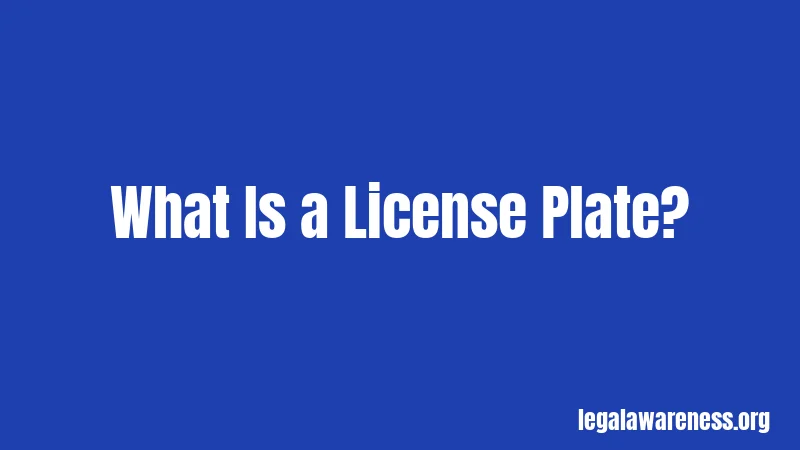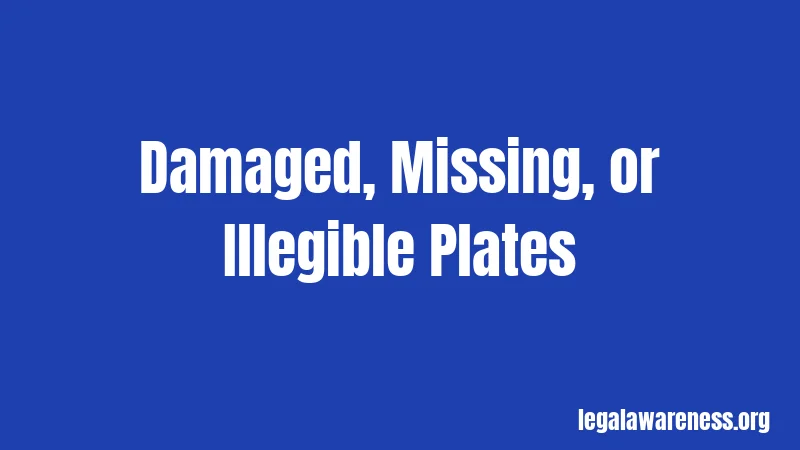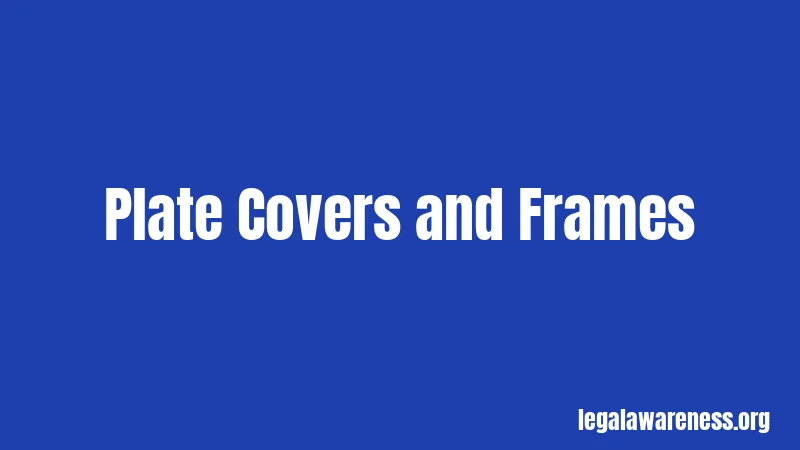Missouri License Plate Laws (2026): What Could Get You a Ticket
Most people never think about their license plates. They just stick them on their car and forget about them. But in Missouri, there are specific rules about how your plates need to look and how you display them. Break these rules, and you could face fines or worse. Let’s walk through exactly what you need to know.
Your license plate is more than just decoration. It’s how law enforcement identifies your vehicle. It’s how tolls get paid. It’s how crimes get solved. That’s why Missouri has strict rules about them. And honestly? Most people have no idea how detailed these rules actually are.
What Is a License Plate?

A license plate is the metal or plastic sign on the front and back of your vehicle. It displays your vehicle registration number. In Missouri, your plate proves you’ve registered your car with the state. It also tells others what year your registration is valid.
Think of it like your car’s ID card. Just like your driver’s license identifies you, your plate identifies your vehicle. And just like you can’t tamper with your ID, you can’t mess with your plate either.
Basic Display Rules in Missouri
How Your Plates Must Be Mounted
Here’s the thing: Missouri doesn’t mess around with plate mounting. Your front and rear plates need to be clearly visible. Both must be in good condition. Both must be legible from a distance of 100 feet. Seriously, that’s the law.
You can’t mount your plate at weird angles. You can’t obscure it with anything. Not a cover. Not a frame that hides letters or numbers. Not even decorative items in front of it. Wondering if your frame might be a problem? Check to make sure the letters and numbers are completely visible through it.
Not sure what counts as “obscured”? Here’s the deal. If a cop can’t clearly read your entire plate from a normal viewing angle, you could get a ticket. Don’t take chances with this one.
Both Front and Rear Plates Required
Okay, pause. This part is really important. Missouri requires both a front and rear license plate. Many other states only require a rear plate. Missouri doesn’t do that. You need two plates, period.
Some drivers try to skip the front plate. Maybe they think it looks better without it. Maybe they think it’s not enforced. Either way, you’re breaking the law. You could face a fine. Honestly, this is one of the easiest violations to avoid.
Damaged, Missing, or Illegible Plates

What happens if your plate gets damaged? Maybe rust eats away at it. Maybe you scrape it in a parking lot. If it’s no longer legible, you need to replace it. Missouri won’t let you keep driving with a damaged plate.
Here’s where it gets important. A faded plate counts as illegible. If the numbers and letters are hard to read, that’s a problem. You’re responsible for keeping your plate in readable condition. It’s basically like maintaining your car’s tires or lights.
If your plate is damaged, head to your local DMV and get a replacement. It’s quick and inexpensive. Much cheaper than a ticket. Much faster than dealing with law enforcement.
Missing or Stolen Plates
Someone stole your plate? That happens more often than you’d think. The first thing you need to do is report it to the police. Get a police report number. Then contact the Missouri Department of Revenue.
You’re not in trouble if your plate was stolen. But you do need to replace it immediately. Don’t drive around with a missing plate. You could get pulled over. You could get ticketed. Just get the replacement and move on.
Special License Plates and Vanity Plates
Missouri allows vanity plates. These are custom plates with numbers and letters of your choice. They’re fun. They’re personalized. But they follow the same visibility rules as regular plates.
Your vanity plate still needs to be fully visible. The letters and numbers still need to be legible. You can’t use a vanity plate to hide your registration. The rules don’t change just because your plate is custom.
Wait, it gets better. Missouri offers special plates for veterans, disabled drivers, and environmental advocates. These plates have unique designs. But again, the visibility rules apply to all of them. Your special plate must be just as readable as a standard plate.
Plate Covers and Frames

This is where a lot of people get confused. Can you use a cover over your plate? No. Can you use a decorative frame? Only if it doesn’t obscure any letters or numbers.
Think of it like a traffic ticket, but specifically about your plate. The cover or frame can’t hide anything. It can’t reflect light in a way that makes the plate hard to read. It can’t tint the plate. Some people try to get around this with “dark” or “smoked” covers. Don’t do it. You’ll get a ticket.
Basically, if there’s any doubt about whether something obscures your plate, remove it. The safest move is to skip covers and frames altogether. Or use a clear frame that doesn’t hide anything.
Registration Sticker and Expiration
Your Missouri license plate has an expiration sticker. This sticker shows when your registration expires. It needs to be clearly visible on the plate. It needs to match your actual registration expiration date.
Here’s what happens if your sticker is expired or missing. Law enforcement can pull you over. They can cite you for expired registration. This is more serious than just an invalid plate display. You could face fines. You might need to show proof of valid registration.
Keep your sticker current. When you renew your registration, put the new sticker on immediately. Make sure it’s placed where it’s supposed to go. For most Missouri plates, it goes in the upper right corner of the plate.
Not sure when your registration expires? Check your registration card. Check your DMV account online. Don’t guess. Expired registrations can create legal headaches fast.
Penalties for Plate Violations
So what happens if you break these rules? Let’s get specific about the consequences.
Fines and Citations
An improper plate display violation is a traffic violation in Missouri. First-time offenders typically face a fine between $75 and $200. That’s not huge, but it adds up. It also goes on your record.
Multiple violations can increase your fine. Some violations might result in a fine up to $300. And honestly, this part matters: insurance companies might see this violation. It could affect your rates.
License Suspension
More serious violations can lead to license suspension. If you’re caught with a stolen plate, for example, you could face harsher penalties. If you tamper with your plate or registration sticker, that’s more serious than just having a dirty plate.
Tampering with your plate is a misdemeanor. You could face fines up to $500. You could spend time in jail. You might lose your license. Yes, that’s a huge jump from a simple display violation. But that’s the reality.
Vehicle Registration Requirements
Your license plate is directly tied to your vehicle registration. You can’t separate the two. If your registration isn’t current, your plate isn’t valid. Period.
Missouri requires you to register your vehicle every two years. When you register, you receive a registration card. Carry it with you while driving. Law enforcement can ask to see it along with your plate.
Here’s the important part: if your registration is expired, you can’t legally drive. It doesn’t matter if your plate looks perfect. If the registration that backs it up is no longer valid, you’re breaking the law.
Special Circumstances
Temporary Plates
Sometimes the DMV issues temporary plates. Maybe you just bought a car. Maybe you’re transferring a registration. Temporary plates are valid registration. They look different from regular plates, but they count.
Temporary plates usually come on a paper document. You tape it to your back window. It needs to be clearly visible. It needs to stay intact. If your temporary plate gets damaged or torn, replace it immediately.
Out-of-State Plates
Moving to Missouri from another state? You have a grace period. You can drive with your old plates for a limited time. But eventually, you need to register in Missouri and get Missouri plates.
The grace period is usually around 30 days. Don’t assume you have longer. Check with the Missouri DMV to be sure. Once your period expires, out-of-state plates are no longer valid in Missouri. Switch to Missouri registration right away.
Commercial Vehicles
Commercial plates follow the same display rules as regular plates. If you operate a truck, van, or commercial vehicle, your plate must be fully visible and legible. The rules don’t change because it’s a business vehicle.
Some commercial operations get special plates. Construction companies, utility trucks, and fleet vehicles might have different colored or styled plates. But the visibility requirement stays the same.
How to Report License Plate Violations
Saw someone with a clearly illegal plate display? You can report it. But honestly, minor violations like a dirty plate aren’t worth reporting. Save the reports for serious issues.
Report stolen plates or signs of vehicle tampering. Report plates that are completely obscured. Report suspicious activity related to plates. You can contact your local police department or the Missouri Highway Patrol.
Have documentation if you report something. A photo helps. Note the vehicle’s location and time. Give as much detail as possible. But remember, minor infractions usually don’t get investigated. Focus on actual safety or serious legal issues.
How to Keep Your Plate Legal
Stay compliant with Missouri’s plate laws. Here’s what you need to do:
Keep both your front and rear plates mounted securely. Check them regularly for damage. If either plate is damaged, faded, or difficult to read, replace it immediately. The Missouri DMV can help you get a replacement plate.
Keep your registration current. Renew before it expires. When you get a new registration, update your sticker right away. Check your registration card regularly to confirm your expiration date.
Avoid covers, frames, or anything that might obscure your plate. Even if something seems like it wouldn’t hide anything, why risk it? A clean, simple plate display is always the safest option.
If your plate is stolen or lost, report it to police and the DMV. Get a replacement plate quickly. Don’t drive around hoping nobody notices. It’s not worth the stress or potential ticket.
Frequently Asked Questions
Can I use a plate frame? Only if it doesn’t obscure any letters, numbers, or other required information on your plate. Clear frames that don’t hide anything are usually fine. Decorative frames that might make the plate hard to read are not okay.
What if I just moved to Missouri? You typically have about 30 days to transfer your registration and get Missouri plates. Don’t wait until the last minute. Head to the DMV early to avoid stress and potential violations.
How much does a replacement plate cost? Replacement plates in Missouri cost around $15 to $25, depending on the type. Vanity plates or special plates might cost more. Check the current DMV fee schedule to be sure.
Is a dirty plate illegal? If your plate is so dirty that it’s illegible from 100 feet away, yes, it’s illegal. Keep your plates clean. It takes literally two minutes to wipe them off.
What if I have a really damaged plate? Get a replacement. The Missouri DMV makes this easy and affordable. Driving with a damaged or unreadable plate is asking for a ticket. Just replace it.
Final Thoughts
Missouri’s license plate laws aren’t complicated. Display both plates clearly. Keep them readable. Keep your registration current. That’s basically it.
Sounds simple, right? It is. The violations happen when people ignore these basic rules. They drive with missing plates. They let plates get too dirty to read. They ignore expiration dates. They use covers that hide their information.
Don’t be that person. Follow the rules. Keep your plates visible and legible. Keep your registration current. And when in doubt, check with the Missouri DMV or consult with a lawyer.
Now you know the basics. Stay informed, stay legal, and keep your car complaint-free.
References
Missouri Department of Revenue – Vehicle Registration https://dor.mo.gov/documents/form/vehicle-registration
Missouri Revised Statutes – Chapter 301 (Motor Vehicles) https://revisor.mo.gov/mo-code/statutes/v2000/chapter301/
Missouri Highway Patrol – Vehicle Laws https://www.mshp.dps.mo.gov/
Missouri Secretary of State – Driving Information https://www.sos.mo.gov/
City of St. Louis Traffic Regulations https://stlouis-mo.gov/government/departments/public-safety/
This article provides general legal information about Missouri license plate laws. It is not legal advice. For specific legal questions, consult with an attorney licensed to practice in Missouri.
